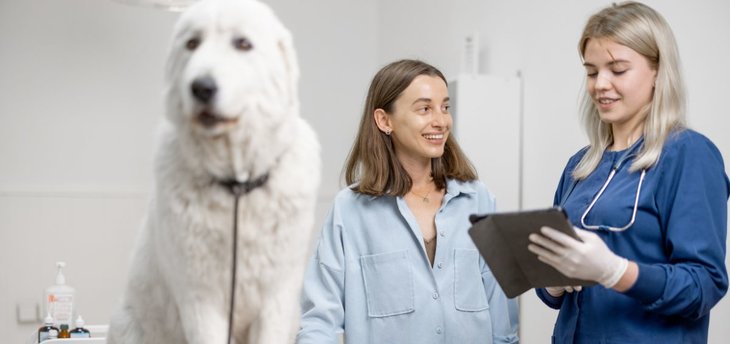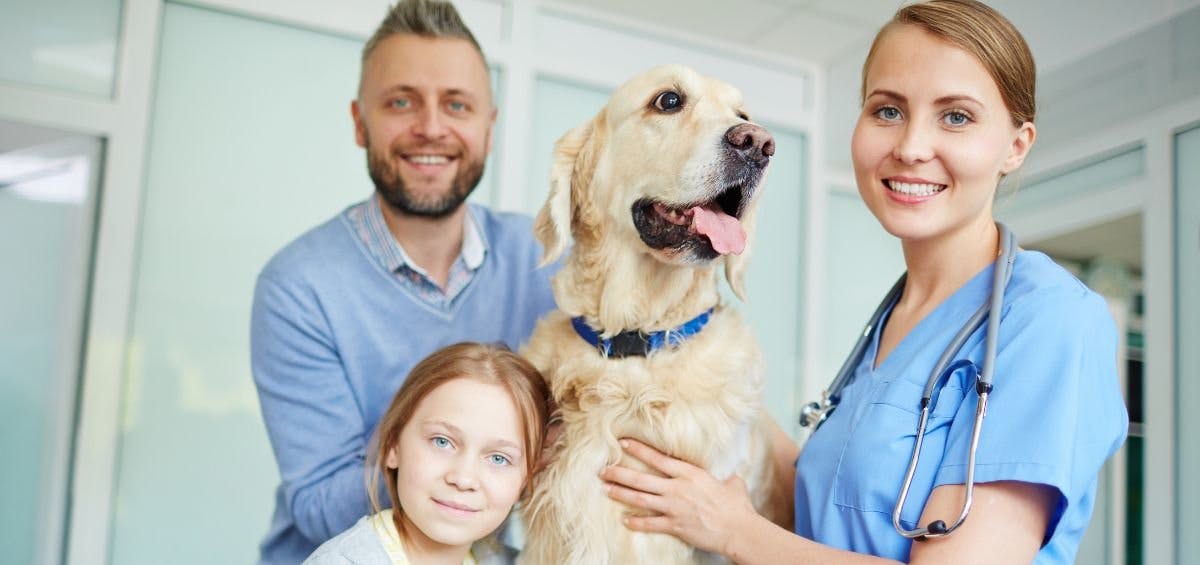6 Things Doctors Say To Do At Your Next Vet Appointment
During a nationwide veterinarian shortage, it has never been truer that you must be your pet’s health advocate. Yet most pet owners have never been told how to best speak to their veterinary medical professionals on behalf of their furry loved ones.
We offer pet owners six things you should do to make the most of your next vet visit, from the perspectives of two specialty doctors: a DVM veterinary specialist and a PhD communication coach.
Use the links below to jump to more information on each vet tip:
1. Come prepared
Nobody hates going to the mechanic more than when their car does not make the noise it’s been making for days. The same is frustrating for pet owners. When your furry companion is acting out of sorts at home, grab your phone and get video footage.
Maybe the behavior is normal; maybe it’s not. Bringing in a recording will help take the pressure off you and your pet and will provide the doctor essential insights to make the most of your hard-to-get visit.
When scheduling your appointment, communicate with the vet office and ask if there's anything you need to know, bring, or fill out beforehand. For instance, if a fecal exam may be required to diagnose a bout of diarrhea, collect a fresh stool sample that morning to save yourself a return trip and get faster results.
Ultimately, coming prepared saves everyone time – and benefits your pet best of all by ensuring they receive the most expedient care.
2. Take notes
You’re not dumb for not understanding your vet’s explanation. But you can do more to help yourself understand before you leave the office.
Communication research shows that from as early as seven years old, we begin to stop asking questions out of a fear of looking dumb – a fear of vulnerability. With the intense scheduling demands facing pet hospitals right now, you must make the most of each visit by asking for clarification.
Try asking this way: “Can you explain your thought process behind your diagnosis/treatment plan using lay terms for me, please?” While health communication research indicates that even highly intelligent people learn better when information is simplified, your vet may still be speaking quickly, using technical jargon that makes it hard to process the new information.
You will make the most out of your visit by making sure you understand the WHY that will guide your decisions and follow-through.

3. Know all your options
Many patients experience a phenomenon known as “emotional hijacking” when dealing with a sick pet. This refers to the overwhelming and disorienting emotions that cloud your ability to understand, remember, and rationally act upon information.
To overcome this, take notes at the vet, or ask the doctor to put it in writing for you. Prioritize these three questions:
- “What are my primary options?"
- "What are the prognoses for each?"
- "What side effects should I look out for?”
This will help you set reasonable expectations for whatever treatment you choose, reducing panic days later when side effects present or you second-guess your treatment decision.
4. Turn the table
Some veterinarians are hesitant to be direct in suggesting what treatment option you should choose. It’s a byproduct of many factors and can leave patients feeling more confused and stuck than before they came into the clinic.
If you're uncertain about which treatment plan to follow, you can gain clarity and confidence in your decision by asking your veterinarian, “If it were your pet experiencing this, what would you choose?”
5. Ask about payment plans
Research has found that people are actually more likely to say “yes” than we expect, especially when you ask more than once. So if you need help paying for an expensive treatment, ask for it.
From payment plans to loyalty discounts to low-income funding, there are likely many options available to you. Be sure the clinic provides you with itemized receipts that you will likely need when filing a claim with your pet insurance provider, and enroll in direct deposit to get reimbursed faster than a check by mail.
6. Be gracious
Working with animals may seem like a delightful job, and it can be. However, working with sick animals and frustrated pet owners can take its toll.
According to the CDC, veterinarians and vet technicians are significantly more likely to commit suicide than the general population – 5.0 times more likely for males and 2.3 times more likely for females. So, next time you visit your vet, even if it took a while to get the appointment, make sure you are kind. A gracious attitude can make a big impact on those around us.
Final Thoughts
These tips will be increasingly valuable as the shortage worsens over the next decade. According to research from Mars Veterinary Health, the pre-pandemic need has not only gotten worse, but will also continue. By 2030, the crisis will result in a shortage of 15,000 veterinarians – so make every interaction with yours valuable.
Do you want to find the best pet insurance?
Let's analyze your pet's breed, age, and location to find the right coverage and the best savings. Ready?
Analyze My PetAbout Pawlicy Advisor
The pet insurance marketplace endorsed by veterinarians, at Pawlicy Advisor we make buying the best pet insurance easier. By comparing personalized coverage and pricing differences we can save you a ton of money, up to 83% in some instances!
Instantly Compare Pet Insurance Plans
Guides
Determine If Pet Insurance Is Worth It
Comparison Charts
Find Your State
Dog Insurance
Veterinary Neurosurgeon - Eastern Pennsylvania Veterinary Medical Center
Gaemia Tracy, DVM, is a board-certified veterinary neurosurgeon at Eastern Pennsylvania Veterinary Medical Center located north of Philadelphia. He co-authored this with Dr. Stephen J. Lind (PhD), an associate professor in business communication at USC’s Marshall School of Business in Los Angeles.
